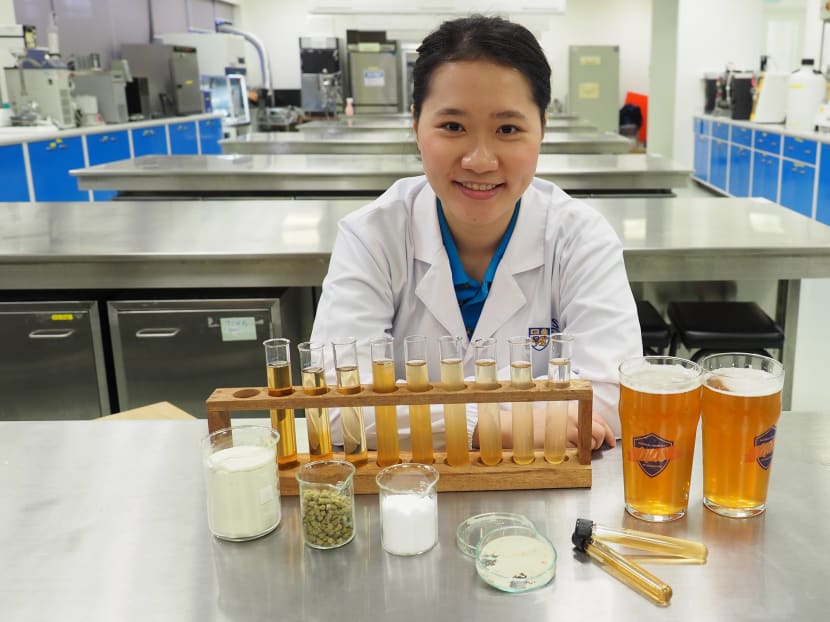Move over, yogurt: Probiotic beer is NUS researchers’ new creation
SINGAPORE — A 22-year-old science undergraduate at the National University of Singapore (NUS) has found a way to infuse live probiotics, or good bacteria, into beer, giving those who love a tipple a more gut-friendly alternative.

Ms Alcine Chan’s beer has attracted the interest of one Japanese brewery, and she and her final-year project supervisor have filed for a patent to protect its recipe. Photo: Syed Ebrahim/TODAY
SINGAPORE — A 22-year-old science undergraduate at the National University of Singapore (NUS) has found a way to infuse live probiotics, or good bacteria, into beer, giving those who love a tipple a more gut-friendly alternative.
Ms Alcine Chan’s beer has attracted the interest of one Japanese brewery, and she and her final-year project supervisor have filed for a patent to protect its recipe.
The probiotic strain they managed to incorporate into beer, known as Lactobacillus paracasei, can neutralise toxins and viruses in the body, while boosting immunity and improving gut health.
The result is a sour beer with sharp and tart flavours, carrying fruity notes from the probiotics.
Currently, no beers in the market contain probiotics as the beverage has hop acids, which are extracted from the flowers of the hop plant and give beer its bitter, zesty or citrus flavours.
Both the acids and alcohol prevent the growth and survival of probiotics. But the NUS team managed to infuse one billion probiotics into every 100ml of beer. For probiotics to have health benefits, the International Scientific Association for Probiotics and Prebiotics recommends a minimum of one billion probiotics per serving.
Ms Chan, who had never brewed a pint of beer previously, mooted the idea for her final-year project as she takes dairy-based probiotic drinks daily. The casual beer drinker thought that since “beer will never die”, being widely drunk at social events, she could devise something with an added health benefit. “When I go shopping in the supermarket, I don’t see many probiotic products, except for those in dairy products,” she said.
While people who are allergic to proteins or are lactose intolerant may avoid such dairy products, they will be able to drink the probiotic beer, added Ms Chan, who will be graduating with a Bachelor of Applied Science with Honours (Highest Distinction) next month.
While pointing out that consuming an excess of probiotics is “not harmful”, she added: “We are not recommending (people) overdrink ... (The probiotic beer should be drunk) in moderation because it still contains alcohol.”
With the help of her supervisor, Associate Professor Liu Shao Quan from the Food Science and Technology programme at the NUS Faculty of Science, Ms Chan experimented with six probiotic strains over nine months. She tried brewing with different temperatures and varying amounts of hops, among other things, before she managed to find the set of conditions where probiotics could thrive in beer.
Ms Chan’s final product has an alcohol content of 3.5 per cent, and would take about a month to brew, similar to the time required for normal beers. The beer, which has a shelf life of three weeks, is kept unfiltered and unpasteurised to retain its live probiotic counts.
Assoc Prof Liu, who noted that some other major breweries are in the midst of developing probiotic beers, said: “The general health benefits associated with consuming food and beverages with probiotic strains have driven demand dramatically. In recent years, consumption of craft beers has gained popularity, too. Alcine’s invention is placed in a unique position that caters to these two trends.”











